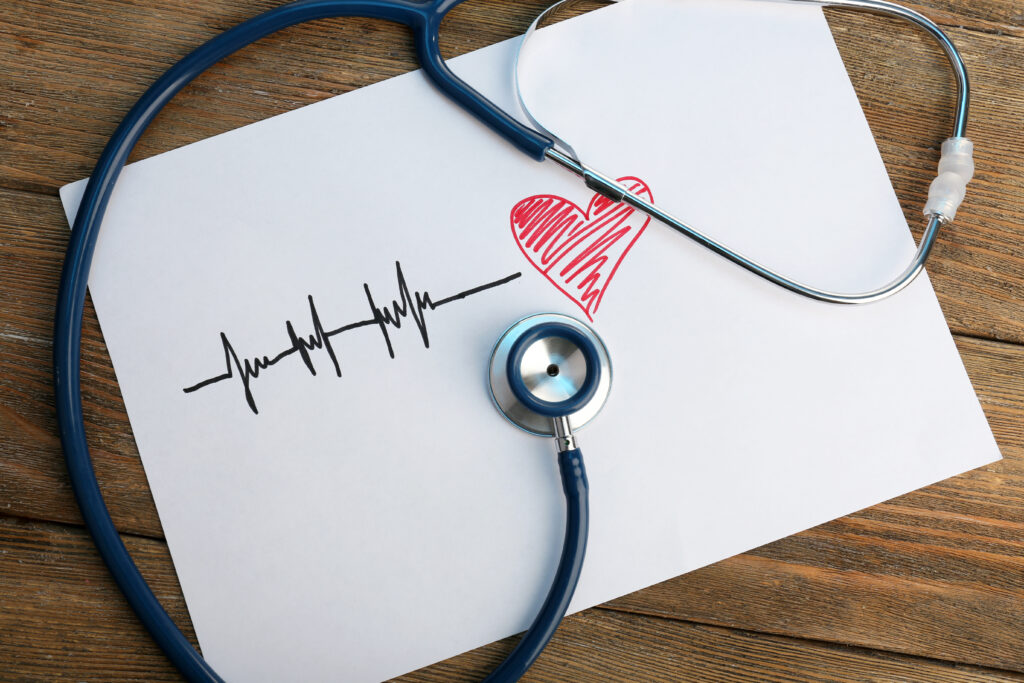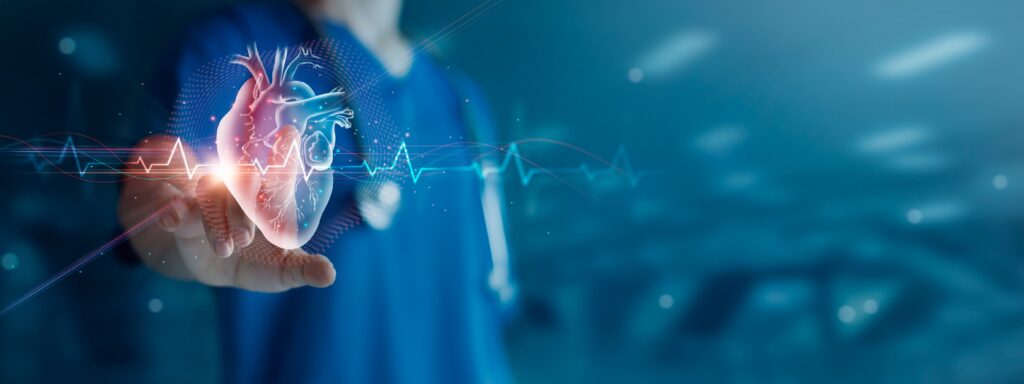If the average heart rate is 80 beats per minute, your heart will beat 4,800 times an hour. It amounts to a staggering 115,200 times each day. Your heart would beat around 42,048,000 times in a year!
The heart is a complex system with ventricles, valves, veins, and arteries that pumps blood throughout the body, gives it the oxygen and nutrition it needs, and removes waste.
But a system that complex can go awry. As not all cardiac diseases have symptoms, you might not always be aware that this is happening. Speak with a specialist if you have any concerns regarding your heart health.
These are a few ways your physician can examine your heart:
Blood tests:
There are various reasons to undergo blood testing. In an emergency, it can measure toxins that manifest in the blood as well as the degree of heart muscle injury. A blood test can detect chemicals that are released into the blood stream when heart muscle is injured as a result of a heart attack.
Blood tests are also carried out to identify diabetes, excessive cholesterol, and to monitor kidney and liver function, which can all be used to determine whether or not a patient with a cardiac disease can take certain medications.
ECG:
An easy and rapid test is an ECG. It is employed to evaluate the heart’s electrical system. A shift in an ECG will indicate thickened heart muscles, heart attacks, and abnormal heart rhythms. Often, this is done when you are “at rest” (laying down), but your doctor may also want to assess how your heart responds to stress (induced by treadmill exercise or medication).
Your doctor could advise getting an ECG if:
- You might be suffering from high blood pressure.
- You have palpitations, shortness of breath, or chest pain.
- You have a heart disease risk (eg. if you have a family history of the condition, or if you have diabetes)
- You experienced a fainting spell.
Stress test:
A stress test, often known as an “exercise” test, is a specific sort of ECG that is carried out while a person is working out. This test is designed to find out how well a person’s heart responds to stress. Exercise can help expose issues with blood flow within the heart, blood pressure changes, and cardiac rhythm issues since it causes the heart to beat harder and quicker. The typical stress test comprises using a treadmill or stationary cycle while breathing, blood pressure, and heart rate are all being monitored.
Chest x-ray:
A typical medical scan that creates images of your organs, tissues, and bones is an x-ray. High-energy photons called X-rays, as opposed to low-energy photons that make up light, are partially absorbed by the bones and soft tissues of your body, creating shadows and outlines of the heart, lung, and bones.
Chest x-rays are also used to look for lung cancer, emphysema, and other dangerous illnesses including pneumonia. Your doctor might suggest one if
- Have been involved in an accident
- You have a chronic cough, shortness of breath, or chest pain.
In reality, X-rays are short, simple tests that subject your body to very little radiation. There won’t be anything specific you need to do in advance. You’ll be given a hospital gown by our staff, and you might have to take off your jewellery, eyeglasses, and body piercings. Tell your doctor right away if you have any metal implants, such as a pacemaker, and, most critically, if you are pregnant or think you could be.
Before to providing you with the results, your images will be examined by your doctor and a radiologist (a medical professional who specialises in the interpretation of x-rays).
MRI scan:
Using extremely powerful magnets and radio waves, an MRI is performed to produce finely detailed images of the heart on a computer. The heart is captured in both still and moving images. Sometimes a special dye is applied to enhance the visibility of the heart and coronary arteries. The heart’s structure, functionality, and presence of scarring can all be seen by the doctor thanks to the MRI.
Echocardiogram:
An echocardiogram creates images of your heart using high-frequency sound waves (ultrasound). The doctor can then evaluate the heart’s structure and function thanks to this.
An echocardiography may be necessary for patients who are experiencing chest pain and shortness of breath in order to rule out illnesses like blood clots in the lung, fluid buildup, and heart valve issues. By doing so, the doctor will be able to identify the condition’s origin and effect and tailor your care to it. It is regularly carried done following a heart attack. Echocardiograms don’t include radiation like x-rays do. They are typically seen as being quite secure.
Your physician might suggest an echocardiography if:
- You may have heart disease, such as heart failure, malfunctioning heart valves, irregular heartbeat, or a heart attack.
- Your new-born infant may have a cardiac problem.
CT Coronary Angiogram:
A computer tomography (CT) scan of the heart creates a 3D image of the heart using data from several quickly taken x-rays. A special kind of CT scan called a coronary CT angiography can look for heart-related issues.
A particular x-ray test called a coronary CT angiography looks for heart artery blockages. Your doctor will administer a dye through a vein in your hand or arm to your arteries, outlining the cardiac arteries and any blockages that may be present. This scan is the gold standard for detecting heart diseases as it allows doctors to look into the heart and surrounding heart arteries in minute detail to determine if there are signs of any abnormalities.
A CTCA may be advised by your doctor if you have any of the following:
- Unknown discomfort or pain in the chest
- abnormally high blood pressure and/or symptoms that could indicate a significant arterial tear
- high CT coronary calcium score abnormality
- Your stress test yielded uncertain findings.
However, due to the radiation involved and the fact that each organ requires a somewhat different scan procedure, your doctor will order a CT scan based on your needs. CT scans are also used to evaluate various body components.
Calcium Scan:
A plain CT scan of the heart without contrast is called a “calcium scan”. You won’t need to take any particular precautions to undertake a Coronary Calcium Scan, which is quick and simple. It looks for “hardened” calcium and cholesterol deposits that may crack and form blood clots that might result in heart attacks. This test will help determine whether you are at risk of having a heart attack. Your doctor may advise a more in-depth test or suggest lifestyle adjustments in response to the results (eg. medication, diet and exercise).
A score representing the overall amount of calcium deposits, is typically provided after the scan, and based on the patient’s age, the scores are interpreted as follows:
- 0: The heart has no calcium, indicating a low likelihood that a heart attack would occur in the future.
- 100–300: There are moderate plaque deposits. Over the following three to five years, there is a comparatively significant risk of heart attack or other cardiac problems.
- More than 300: Denotes a very high to severe illness and heart attack risk.
Early Heart Disease Detection with Echelon Health:
While these lifestyle factors can help you to reduce your chances of heart disease, it’s impossible to prevent it completely. Heart disease can occur in everyone, particularly older adults. If you do suffer from any type of heart disease, then there are treatments that can improve your quality of life and reduce your chances of a heart attack.
One of the most important factors for a positive prognosis is discovering heart conditions at the earliest stage possible or even preventing an episode before it happens. A health assessment with your doctor will go a long way to allow you to understand your health and find ways of managing or improving it.
Regular health assessments are offered by the NHS from around age 40 for women and men starting with breast exams and prostate checks as appropriate. However as useful as these checks are they are not made for each person individually. Echelon Health believes that there is no ‘one size fits all’ approach when it comes to health, and we understand the value of early detection.
Using our vast medical experience and the best imaging technology available in the UK, we are determined to provide the most comprehensive health assessment possible. This covers heart disease, and our Healthy Heart package aims to detect various heart diseases at their earliest stages. It can help detect not only arrhythmia but also coronary heart disease and more. Here is what is included in our Healthy Heart assessment:
- Medical questionnaire
- Blood tests
- ECG
- CT coronary angiogram
- Final consultation
Our Platinum Assessment is one of the most comprehensive in the world. Combining a thorough set of blood tests (over 40 parameters including cancer markers) and the best imaging technology available today through CT, MRI and ultrasound scans it can detect up to 92% and up to 95% of the causes of premature death among men and women respectively.
This package offers a full health screening; the following tests and scans are included in the platinum package:
- Blood Tests
- ECG
- CT Aorta
- CT Heart
- CT Coronary Angiogram
- CT Chest
- CT Pelvis
- CT Virtual Colonoscopy
- CT Bone Density
- EOS
- CT Upright Skeleton
- MRI Brain
- MRI Cerebral Artery Angiogram
- MRI Carotid Artery Angiogram
- MRI Prostate
- Ultrasound Thyroid
- Ultrasound Testes/Ovaries
- Digital Mammogram
- Full Body Mole Screen
At Echelon Health we are focused on preventive health screenings and how they can help people better understand their health and how to improve it. It is far easier to take care of yourself and maintain your health when you have complete peace of mind.
If you want to find out more about your heart health, then book a consultation or scan with the healthcare experts at Echelon Health. Visit our health assessments page to find out more.
Sources:
How many times does your heart beat in a lifetime? Wonderopolis. (n.d.). Retrieved April 11, 2023, from https://www.wonderopolis.org/wonder/how-many-times-does-your-heart-beat-in-a-lifetime#:~:text=If%20you%20use%20an%20average,have%20beaten%20approximately%203%2C363%2C840%2C000%20times!
(no date) Common medical tests to diagnose heart conditions. Available at: https://www.healthywa.wa.gov.au/Articles/A_E/Common-medical-tests-to-diagnose-heart-conditions (Accessed: April 11, 2023).
Coronary calcium score (heart scan): Scoring range & what it means (no date) WebMD. WebMD. Available at: https://www.webmd.com/heart-disease/coronary-calcium-scan#1 (Accessed: April 11, 2023).
CT coronary angiogram (2022) Mayo Clinic. Mayo Foundation for Medical Education and Research. Available at: https://www.mayoclinic.org/tests-procedures/ct-coronary-angiogram/about/pac-20385117 (Accessed: April 11, 2023).
Diagnosing heart disease with cardiac computed tomography (CT) (no date) WebMD. WebMD. Available at: https://www.webmd.com/heart-disease/guide/ct-heart-scan#1 (Accessed: April 11, 2023).
Echocardiogram: What it shows, purpose, types, and results (no date) WebMD. WebMD. Available at: https://www.webmd.com/heart-disease/diagnosing-echocardiogram#1 (Accessed: April 11, 2023).
Heart scan (coronary calcium scan) (2021) Mayo Clinic. Mayo Foundation for Medical Education and Research. Available at: https://www.mayoclinic.org/tests-procedures/heart-scan/about/pac-20384686 (Accessed: April 11, 2023).
Krans, B. (2017) Chest X-ray: Purpose, procedure, and risks, Healthline. Healthline Media. Available at: https://www.healthline.com/health/chest-x-ray (Accessed: April 11, 2023).
Stress test (2022) Mayo Clinic. Mayo Foundation for Medical Education and Research. Available at: https://www.mayoclinic.org/tests-procedures/stress-test/about/pac-20385234 (Accessed: April 11, 2023).
What is an electrocardiogram (EKG or ECG) test: Purpose & Types (no date) WebMD. WebMD. Available at: https://www.webmd.com/heart-disease/electrocardiogram-ekgs#1 (Accessed: April 11, 2023).



